We asked them to share who and what inspires them, what life is like as a woman on the frontline of breast cancer research, and the pearls of wisdom they have for any aspiring young scientists.
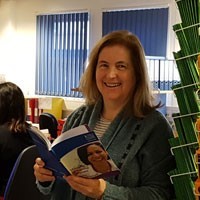 Professor Deborah Fenlon, Professor of Nursing at Swansea University
Professor Deborah Fenlon, Professor of Nursing at Swansea University
"My research is about cancer survivorship; working to understand the experiences of people after they have been treated for cancer and exploring and testing interventions to help them manage cancer related problems."
How did you decide to become a scientist?
"It has always been important to me to understand how and why things work. In nursing, it seems even more important to be sure that we have evidence to know that we are doing the right things – that what we do is actually working and works in the best way it can."
Who has inspired you?
"When I worked with Professor Powles at the Royal Marsden he showed me that research can be an integral part of everyday clinical practice; that pushing forward the boundaries of what we know is something that we should all be doing, all the time."
What has been the toughest challenge you’ve faced in your career?
"Giving up being a senior nurse in order to start at the bottom again to do my PhD."
What has been your proudest moment so far?
"When I first realised that I could take the lead in multi-disciplinary research, pulling together and leading teams of high profile scientists to conduct important research that matters to people with cancer."
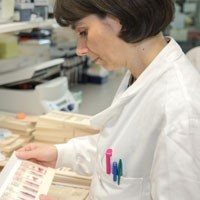 Dr Karen Blyth, Senior Staff Scientist & Head of Lab at The Beatson Institute for Cancer Research, Glasgow
Dr Karen Blyth, Senior Staff Scientist & Head of Lab at The Beatson Institute for Cancer Research, Glasgow
"I am interested in understanding how certain signalling pathways cause breast cancer, and if we can dissect the mechanism of how these altered genetic events causes cancerous changes which may unveil novel ways to therapeutically target cancer for patient benefit."
What do you love about working in science?
"What other job allows you to design and carry out experiments to answer important questions and make discoveries that could help alleviate disease processes?"
What message would you like to share with young girls who are aspiring scientists?
"This is an awesome job which is never dull! If you have an inquisitive mind and love to solve problems and/or make discoveries then a career in science is for you."
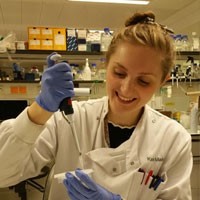 Kate Makin, PhD Student in Professor Dylan Edwards’ lab, Norwich Medical School
Kate Makin, PhD Student in Professor Dylan Edwards’ lab, Norwich Medical School
"My research is focused on an enzyme called MMP8, and the potential role it plays in orchestrating immune cells to fight against breast cancer. The immune system is constantly on patrol looking for cancerous cells, just as it does against bugs that cause the common cold for example. By understanding how the immune system and cancer cells interact, we can get closer to finding therapies that exploit the immune system to treat breast cancer patients."
How did you decide to become a scientist?
"I spent a long time at sixth form wanting to be a medical Doctor, and had this goal even until my second year as Biomedicine undergraduate. This was before I undertook a summer internship in the Edwards lab I work in currently, and fell in love with scientific research. I decided that I loved the intricacies of science, investigating exactly why things happen in minute detail. Medicine couldn’t possibly give me that level of intricacy, and that summer was when I decided I was going to be a scientist!"
What has been the toughest challenge you’ve faced in your career?
"They say the beginning is always the hardest, and in science I have found this to be true. I suffered with a real lack of confidence for my entire first year as a PhD student, often comparing myself to others with much more experience and becoming increasingly frustrated that I wasn’t progressing as quickly as I wanted to with my project. Imposter syndrome, defined as 'a belief that you’re inadequate despite evidence that indicates you’re skilled” is rife amongst scientists, I have fought hard to try and overcome it in my career.
What message would you like to share with young girls who are aspiring scientists?
I want young girls who are aspiring scientists to really believe in themselves and recognise that their ability to think critically, work alongside others and show passion for their subject is just as important as doing experiments. The best piece of advice I can give is to not be afraid of making mistakes and to ask questions even if they may seem silly or obvious. Secretly, everyone is a little unsure of what they are doing, and if we are all in it together then science will benefit much more than us all trying to go it alone!
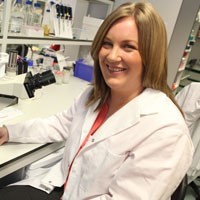 Dr Sharon Glynn, Lecturer Above the Bar in Pathology at Lambe Institute for Translational Research, NUI Galway
Dr Sharon Glynn, Lecturer Above the Bar in Pathology at Lambe Institute for Translational Research, NUI Galway
"I’m interested in understanding how breast cancer hijacks ancient viruses hidden in our DNA & activates enzymes that normally help us heal - to help it grow and spread around the body. Understanding how breast cancer does this will help us improve treatment and save lives."
How did you decide to become a scientist?
"I’d have to say my Dad and my science teacher Mrs. Bury. From a young age I used to go to the then Aer Lingus Young Scientist Exhibition with my Dad who was a judge. Once I started secondary school my science teacher encouraged me to do a project myself. I always loved science and it was a natural progression to do Biotechnology then as my degree."
What do you love about working in science?
"I love that I get to work on things on a daily basis that interest and inspire me. It’s like being a detective! There is nothing like getting exciting results. Also when things aren’t working I love the challenge in trying to understand why, seeing how we can fix it, or even just realising that our hypothesis was wrong. Getting to pass this on to younger scientists is a definite plus."
What message would you like to share with young girls who are aspiring scientists?
"The world is your oyster. You can have any amazing career with science. You can be inspired every day. You can travel anywhere in the world with science. Choose science in school, it won’t let you down. Ultimately though choose a career that you love, then it won’t feel like work but rather something you really want to do on a daily basis."
Read about Dr Sharon Glynn's work.
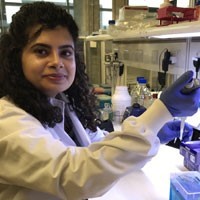 Dana Bhattacharyya, PhD student in Dr Sharon Glynn’s Lab, NUI Galway
Dana Bhattacharyya, PhD student in Dr Sharon Glynn’s Lab, NUI Galway
"8% of the human genome is made up of viral DNA and research has been emerging to show that these viral elements play a role in different cancers. I’m researching the consequences of the expression of these viral proteins in the different subtypes of breast cancer to develop a biomarker for early detection of the disease."
How did you decide to become a scientist?
"I like to fix things which is why I chose to become a cancer scientist. Cancer disrupts normal functioning of the human body and I’m researching ways to detect and prevent dysregulation caused by cancer."
Who has inspired you?
"I’m inspired every day, by my friends, my supervisor and most of all by own curiosity to find answers."
What message would you like to share with young girls who are aspiring scientists?
"Ask questions. Demand answers. Read more and most importantly remember that science reaches far beyond the lab. It saves lives and helps people. If you become a scientist, you’re making a change for the better."
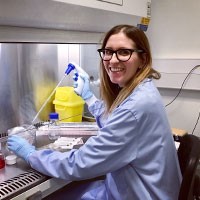 Dr Rachel Eyre, Postdoctoral Research Associate at the Institute of Cancer Sciences, University of Manchester
Dr Rachel Eyre, Postdoctoral Research Associate at the Institute of Cancer Sciences, University of Manchester
"Most breast cancer deaths are caused by breast cancer cells spreading to, and growing in, other parts of the body. The most common place for breast cancer to spread to is the bone, and my research aims to understand how breast cancer cells grow here, and to see how we can prevent this."
Who has inspired you?
"We work opposite the Christie Hospital, the largest cancer hospital in Europe. Out of our lab window we can see patients entering the hospital, and every patient I see inspires me to get on with the job."
What has been your proudest moment so far?
"Personally, I feel pretty proud that I have three children (including six month old twins) and I’m still committed to a scientific career. I’m not 100% sure how it’s going to work, but I’m going to give it a good go! Scientifically, I’m proud every time an experiment works and proves that the theory we’ve been working towards is correct. We’ve recently been doing some experiments trying to prevent breast cancer cells from spreading to the bones in mice, and knowing that we can do it has been a huge work highlight for me."
What message would you like to share with young girls who are aspiring scientists?
Science has traditionally been a very male dominated career. It’s still tough for women, but I think things are changing, and we need more women coming into science to keep challenging perceptions and keep things moving forward. We can do this, but we need more of us!
 Dr Angélica Santiago Gómez, Research Associate at the Institute of Cancer Sciences, University of Manchester
Dr Angélica Santiago Gómez, Research Associate at the Institute of Cancer Sciences, University of Manchester
"Our research aims to understand how cancer cells spread throughout the body and how they are able to survive in a dormant state for long periods of time."
What do you love about working in science?
"Working in science is a never-ending process of learning. There are always innovative ways of answering research questions; it makes you be creative. Research is challenging, competitive but fun too. I do love the fact that something I can discover, even though it might be the smallest piece of the puzzle, will make a difference in people’s lives by improving our understanding of a complex disease like cancer."
What has been the toughest challenge you’ve faced in your career?
"Without a doubt, deciding to move abroad to continue my career after my PhD. I had lived abroad for several months as part of my PhD training, but it was a period of limited duration. Moving away from family and friends, it is one of the hardest things I have ever done. Sometimes your previous life seems far, not only physically but emotionally. Thanks to technology we can overcome long distances! But it was a big change; it puts you out of your comfort zone. However, it turned out to be exciting. I have grown and developed personally and professionally."
What has been your proudest moment so far?
"Several moments come to mind, but the last one was when we were awarded a Project Grant from Breast Cancer Now. I could not believe it when they told us! I remember all the effort and hard work I put in before submission. Of course it is difficult to write a grant with limited word count and as a foreigner the language is an extra challenge added to the equation. I am extremely proud of this achievement; it was a really rewarding experience that allowed me to continue my studies in the breast cancer metastasis field."
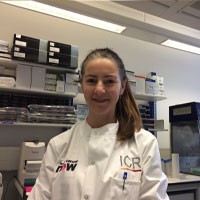 Dr Nichola Johnson, Senior Scientific Officer at the Breast Cancer Now Toby Robins Research Centre, The Institute of Cancer Research, London
Dr Nichola Johnson, Senior Scientific Officer at the Breast Cancer Now Toby Robins Research Centre, The Institute of Cancer Research, London
"The DNA sequence naturally varies between individuals in a population. I’m working to identify genetic variants that are associated with changes in hormone levels and with risk of breast cancer, and whether these inherited genetic variants influence how breast cancer patients respond to treatment."
Who has inspired you?
"Both my DPhil supervisor (Professor Edith Sim) and my current team leader (Dr Olivia Fletcher) are brilliant female scientists and have been great role models, mentors and friends. They have demonstrated how you can be very accomplished at work whilst also successfully balancing the demands of a challenging life away from work. When it occasionally feels tough trying to balance my job, family and home life, I think of them!"
What has been the toughest challenge you’ve faced in your career?
"Working out how to successfully balance work and family life has been a challenge. I have two young children and wanting to continue my scientific career and be able to spend time with them during the working week was a priority. Fortunately, after taking maternity leave, and with the support of my team leader, I was able to return to work part time. My employer, The Institute of Cancer Research, is working hard to promote women in science, supporting their careers by providing an environment that balances the demands of cutting-edge science with family and other responsibilities."
And what has been your proudest moment so far?
"Being offered a place at the University of Oxford to study Biochemistry, which really started off my scientific career, was a proud moment for me. I’d attended a normal comprehensive school in the North West of England, which had no strong tradition of sending students to Oxbridge. It was a great opportunity after studying hard at school."
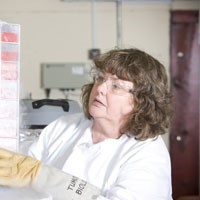 Dr Jennifer Gomm, Cell Programme leader at the Breast Cancer Now Tissue Bank, and Postdoctoral Research Assistant at Barts Cancer Institute
Dr Jennifer Gomm, Cell Programme leader at the Breast Cancer Now Tissue Bank, and Postdoctoral Research Assistant at Barts Cancer Institute
"For 11 years I worked on the role of fibroblast growth factors in the interaction of normal human breast cells. To do this I isolated purified populations of these cells. Now, through the Breast Cancer Now Tissue Bank, I am able to make these cells available to other researches to use in their studies."
How did you decide to become a scientist?
"I had always been fascinated by the natural world around me and how things work. However, my careers advisor at school told me not to go into science. Despite me being a top student in Biology he felt that my maths was not good enough. Instead, he suggested that, like all the girls, I should become a teacher. I quite liked the idea of becoming a teacher but, because he suggested it, I didn’t and because he said not to do science then I did."
What do you love about working in science?
"The freedom of running your own projects. Being able to create my own solutions to difficult problems. The excitement that you feel when your ideas work is second to none."
Who has inspired you?
The brave women with breast cancer. They are my driving force.